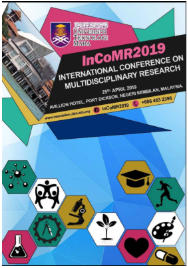PERCEPTIONS OF STUDENTS ON LEARNING ARABIC LANGUAGE VOCABULARY THROUGH A CARD GAME
Keywords:
Vocabulary, Bloom’s Taxonomy, card game, fun learning, learning ArabicAbstract
Vocabulary is essential in mastering any languages. However, learning vocabulary is tedious as it requires students to memorize numerous words and perform a lot of exercises. Thus, it is essential to provide fun learning activities for learning vocabulary in order to promote students’ engagement in the learning process. Since the Arabic language is learnt in various levels of learning institutions such as schools and universities, a card game has a great potential to be utilized as a learning tool to enhance the learning of Arabic language vocabulary. This paper investigated perceptions of students on using a card game named as Ahsulu! in learning the Arabic language vocabulary at the intermediate level of Arabic language proficiency. This study involved students of Degree in Biology and Degree in Chemistry at Universiti Teknologi MARA Negeri Sembilan, Kuala Pilah Campus, Malaysia, who were selected based on purposive sampling. The data gathered by using an online survey and were analyzed descriptively by using Social Science Statistical Package (SPSS) Version 23. The findings suggest that using Ahsulu! as a learning tool could promote fun learning, ensure learning to take place and increase communication.
References
Ali, D. & Elham, D. K. (2015). The Effects of Using Games on English Vocabulary Learning. Journal of Applied Linguistics and Language Research, 2(3), 39-47. Retrieved from www.jallr.ir
Ayesha, P., Muhammad Asif, Sidra, M., Muhammad Kamal, K. & Zafar, I. (2016). Effectiveness of Language Games in Second Language Vocabulary Acquisition. Science International, 28(1), 633-637.
Bakhsh, S. A. (2016). Using Games as a Tool in Teaching Vocabulary to Young Students. English Language Teaching. 9(7), 120-128. DOI: 10.5539/let.v9n7p120
Blachowicz, C.L., & Fisher, P. (2005). Integrated vocabulary instruction. Learning Point Associates. Retrieved from http://.learninggpt.org.
Chen, P., Kuo, R., Chang, M. & Heh, J. (2017). The Effectiveness of Using In-Game Cards as Reward. Research and Practice in Technology Enhanced Learning (12) (15) DOI 10.1186/s41039-017-0054-8
Dalton, E. (2006). Language Learning Games: Why, When, and How. Retrieved from http://gaeacoop.org/dalton/publications/LanguageGames.pdf
Fotini, G. & Zafiri, M. (2017). Adapting Board Games to Stimulate Motivation in Vocabulary Learning in Six Year Old Students: A Case Study. Journal of Studies in Education, 7(3), 1-28. Retrieved from www.macrothink.org/jse
Ganiti, A., Politopoulos, N., & Tsiatsos, T. (2018). The impact of background music on an active video game. Advances in Intelligent Systems and Computing. https://doi.org/10.1007/978-3-319-75175-7_3
Gruss, J. (2016). Games as a Tool for Teaching English Vocabulary to Young Students. World Scientific News. 52(3), 67-109. Retrieved from www.worldscientificnews.com
Huyen, N. T. T. & Nga, Khuat T. T. (2003). Learning vocabulary through games. Asian EFL Journal, 5(4). Retrieved from http://www.asian-efl-journal.com/dec_03_sub.Vn.php
Kwak, M., Casper, D., & Talmage, C. (2018). an Educational Game for Information Literacy and Student Engagement. In Proceedings of the 51st Hawaii International Conference on System Sciences (pp. 3616–3625). Retrieved from http://digitalcommons.georgiasouthern.edu/gaintlit/2015/
/18/
Le, T. T. & Tran, B. T. (2017). Multiple Intelligences-Based Homework and EFL Students’ Vocabulary Learning. International Journal of English Linguistics, 7 ( 6), 73-77.
Lee, H. L. J. (2012). SMARTies: Using a board game in the English classroom for edutainment and assessment. Malaysian Journal of ELT Research, 8(1), 1–35. Retrieved from http://www.melta.org.my/journals/Hygenus_Lee_(2012).pdf
Limantoro, S. W. (2018). Developing Word-Card Games To Improve English Writing. PUPIL: International Journal of Teaching, Education and Learning, 2(3), 38–54. https://doi.org/10.20319/pijtel.2018.23.3854
Mehregan, M. (2014). Game-Based Tasks for Foreign Language Instruction: Perspectives on Young Students’ Vocabulary Acquisition. The IAFOR Journal of Language Learning. Retrieved from http://iafor.org/archives/journals/language-learning/3-Masoumeh-Mehregan.pdf
Metom, L. (2016). The Grammar Odyssey. European Journal of Language and Literature Studies Sep-Dec, 6(1), 54–63.
Mubaslat, M. M. (2012). The Effect of Using Educational Games on The Students’ Achievement in English Language for The Primary Stage. Retrieved from ERIC database. (ERIC Document Reproduction Service No. ED529467.
Muhammad Sabri, S. & Ghazali, Y. (2012). Online Vocabulary Games for Teaching and Learning Arabic. GEMA Online Journal of Language Studies, 12(3), 961-977.
Nimoto, K., Takahashi, K., & Inaba, M. (2016). Improvement of Agent Learning for a Card Game Based on Multi-channel ART Networks. Journal of Computers. 11(4). DOI: 10.17706/jcp.11.4.341-352
Nur Fatin Fatihah, A. R & Albadri, A. (n.d). Using crossword puzzles aided with pictures and scramble words as clue to improve the spelling of year 2 pupils. Semantic Scholar, 1–11. Retrieved from https://www.semanticscholar.org/paper/USING-CROSSWORD-PUZZLES-AIDED-WITH-PICTURES-AND-AS-Ropal-Abu/157f1fa0447d84f8d72b333ee504a49973d1caf8
Nurkhamimi, Z. & Muhammad Sabri, S. (2016) Multimedia Courseware for Teaching Arabic Vocabulary: Let’s Learn from the Experts. Universal Journal of Educational Research 4(5), 1167-1172, DOI:10.13189/ujer.2016.040529 Retrieved from https://files.eric.ed.gov/fulltext/EJ1099878.pdf
Riahipour, P. & Saba, Z. (2012). ESP Vocabulary Instruction: Investigating the Effect of Using A Game Oriented Teaching Method for Students of English For Nursing. Journal of Language and Research, 3(6), 1258-1266.
Silsüpür, B. (2017). Does Using Language Games Affect Vocabulary Learning in EFL Classes? Journal of Foreign Language Education and Technology, 2(1). Retrieved from http://dergipark.gov.tr/download/article-file/285655
Tengku Nazatul Shima, T. D. P., & Rahmah, L. Y. (2013). Use of ‘Time Trap Board Game’ to Teach Grammar. Procedia - Social and Behavioral Sciences, 105, 398–409. https://doi.org/10.1016/j.sbspro.2013.11.042
Uberman, A. (1998). The use of games for vocabulary presentation and revision. Forum, 36(1), 20-27.
Vaishnav, H. (2015). Learning a Language - en route Puzzles and Games. International Journal of English Language, Literature and Humanities, 3(2), 550–560.
Wang, Y. J., Shang, H. F & Briody P. (2011). Investigating the Impact of Using Games in Teaching Children English. International Journal of Learning & Development, 1(1). Retrieved from www.macrothink.org/jse
Zunita M. M., Harun B., Maimun A. L. & Nurul Kamalia Y. (2016). Teaching and Learning Arabic Vocabulary: From a Teacher’s Experiences. Creative Education, 7. Retrieved from http://www.scirp.org/journal/ce/
Zhi, F. L. E. & Chen, P. (2013). The Effect of Game-Based Learning on Students’ Learning Performance in Science Learning – A Case of "Conveyance Go". Procedia - Social and Behavioral Sciences (103), 1044 – 1051.
Downloads
Published
Issue
Section
License
Copyright (c) 2019 Journal of Academia

This work is licensed under a Creative Commons Attribution-NonCommercial-NoDerivatives 4.0 International License.












